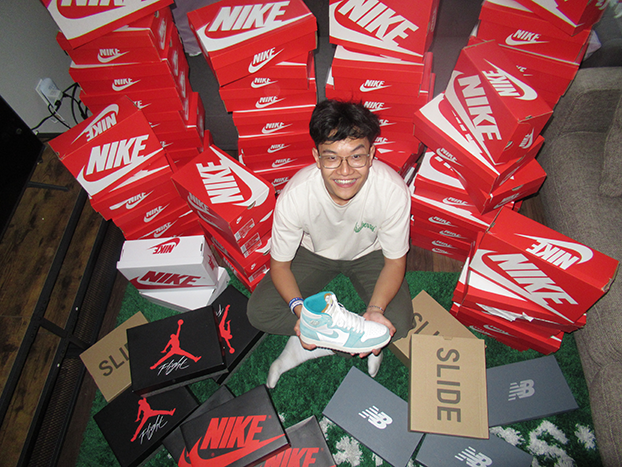Nike Dunks. Air Jordans. New Balance 550s. Over 150 shoeboxes line the walls of Weinberg third-year Vincent Mei’s apartment, the makeshift warehouse for his shoe-reselling company, Exhibit Chicago.
Four years ago, Mei and his younger brother Ivan sold their bikes to raise funds to start Exhibit Chicago. They’ve slowly built a dense network of hundreds of connections with buyers and sellers in the industry and have made over $75,000 in revenue.
“We sold both of our bikes, and we took that $2,200 and we just kept flipping until we got to where we are now,” Mei says.
By “flipping,” Mei means “shoe-flipping,” a common practice in the hypercompetitive fashion sneaker market. He buys shoes in bulk for a lower price from distributors who sell exclusively to resellers like him. For retailers and online resellers like StockX or GOAT, the shoes go through a middleman for authentication, costing time and money. As a personal reseller, Mei can skip authentication and provide shoes at a similar price, but far quicker than customers would get them from those other outlets. Mei says his customers usually get their product “the day of or within the week” of the purchase depending on their schedules.
“People really like convenience, so being able to get someone their shoe on hand right after they’ve paid is really good,” Mei says.
Mei is committed to Exhibit Chicago but doesn’t let it interfere with his studies. He says he dedicates 4-5 hours per week to his business. During study breaks, he takes 10-15 minutes to post shoes on his Instagram story. When people message him, he tries to respond quickly.
However, his passion for the shoe industry means that he also constantly watches videos, follows brands’ updates and does research about the market in his free time.
“Keeping up with the market is not an easy thing to do. There’s new releases every single day, or every single week there’s like five new shoes dropping,” Mei says.

Vincent Mei, founder and owner of Exhibit Chicago, sits with his merchandise. (Photo by Eloise Apple)
In Mei’s eyes, the most rewarding part of the job is making contacts in the industry.
“Connections to me are the most useful thing that I have. It’s not about the 150 pairs of shoes I have in my room in my apartment. It’s about the people that I meet,” Mei says.
The hustle is not without its drawbacks. Mei describes the industry as unpredictable; he may sell 25 pairs of shoes in some months, while others can leave him with barely any sales.
“The money is just an extra thing that comes with it,” Mei says. “The value that I’m capable of providing people who are interested in shoes — and even if they’re not interested, getting them interested in shoes — and giving them something that they can wear that they’re comfortable with and feel confident with is something that I care a lot about.”